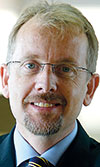
When building sustainable cities, it is vital to first understand the difference between a smart city and a sustainable city. According to Mark Walker, associate vice-president of IDC sub-Saharan Africa, Middle East and Turkey, a smart city can be defined as a city that is completely connected and where that connectivity is used to enhance communication, security, the movement and monitoring of people and interdepartmental communications, to name a few.

“It’s basically the Internet of Things as applied to a city,” he says. A sustainable city, on the other hand, implies that these elements are in place, that it continues and is not a once-off project.
“The problem with the consequent smart city is that it requires many systems to be working together and often what happens is that ‘smart parts’ are implemented as point-in-time projects and they’re not sustainable,” says Walker. “A sustainable smart city is where the parts are ‘smart’, integrated and they continue working.”
He cites Nairobi as an example, where there is a smart city concept specifically around traffic management, but because it is not integrated with other parts of the city, it is not as effective as it could be, making the sustainability of the system questionable.
An integrated approach is crucial
For better understanding, Walker provides the example of the electricity billing process. “Similarly, when a city provides electricity to citizens, there are multiple players involved in the transaction. It is the electricity supplier, the consumer and the municipality involved. In a smart city, all the billing is connected and the consumption patterns are understood. So, if a person misses a payment, for instance, but their supply has been constant over time, the city can see that and question why they haven’t paid and relate that back to consumption.”
He adds that active metering services would allow municipalities to be a lot more precise in terms of provisioning and managing electricity, enabling them to also detect fraud. “If people are compromising their meter to get free electricity, the city can detect major discrepancies in consumption. That’s an example of a smart city solution, but if there isn’t integration between the billing department at the municipality and the supplier, it can’t happen.”
Walker believes that while there is some level of awareness and understanding of the value of a smart city, poor execution and implementation is standing in the way of it becoming a reality, with the two biggest pitfalls being budget and political will.
He says that Gauteng came close with the 2010 Soccer World Cup, but only on the aspect of security. “That was an example, to a degree, of how a smart city can work. There was an understanding of the ticket sales, where the people would be moving from time to time, which enabled the synchronisation of traffic flow and availability of services. This was as a result of coordination between government and the citizen and also with enterprise and making that work together. So, there’s an understanding of smart cities, but it is also limited. People get the picture and they like the picture, but the execution and the implementation are still a long way off.”
It’s a full-time responsibility
While both public and private sector have a role to play, solid planning is crucial to successful smart city implementation. “Ideally, it would be government-led or city-led, but that should be a specific responsibility and not a sub responsibility. It’s not a case of it just being a sub-set of the CIO or the City Manager’s responsibilities. There has to be a person with serious decision-making power to drive the project and this person has to be able to work across various functions within the city to ensure all the elements are brought together from ICT to logistics, from process to people. A smart city is a much broader discussion than just technology.”
With South Africa already facing service delivery protests on a regular basis, smart cities could alleviate many of the challenges and improve citizen satisfaction. “Government service delivery will immediately be improved, without a doubt,” says Walker. “The problem is that there is a massive degree of transparency that comes with a smart city and government departments or municipalities might not necessarily be ready for that level of transparency.”
Moving beyond just the conversation
From a technology vendor perspective, the conversation around smart cities has started, but it is still at the very first stages of promotion, advertising what it is and defining smart cities. We are still at the start of the education phase. “We haven’t even moved into the prioritisation and execution phases yet. There is also the risk that smart cities can become like cloud and big data, just another ICT hype cycle.”
Walker believes that the country is now at a point where it must define what smart cities are, what benefits they can bring to both local government and citizens and how to then prioritise and implement the right solutions to derive the most benefit from the investment. “The final step is then to determine how you coordinate all the priorities to ensure you deliver a smart city, that you can afford, implement and sustain,” he concludes.
© Technews Publishing (Pty) Ltd. | All Rights Reserved.